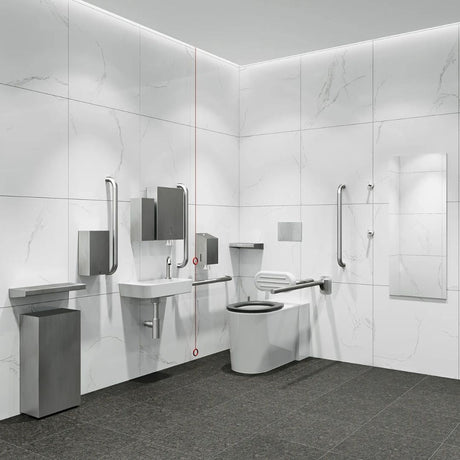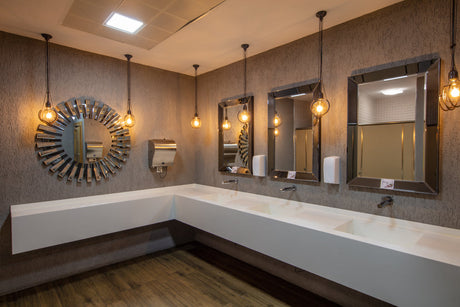Bamboo loo roll seems to be the ‘it’ product for your bathroom these days, and who can blame you when its so much better for our planet than your classic toilet paper.
Want to know more about Bamboo Bobbi and the science behind it all? We’ve summarised the key facts of our commissioned independent report in this Bamboo Bobbi blog post .
Toilet roll is typically made of paper – which obviously comes from trees. According to the Confederation of Paper Industries, the UK uses 1.3m tonnes of tissue a year, with the average British consumer reportedly getting through 127 rolls every year .
The average tree that weighs around 1,000 pounds produces just over 800 rolls of toilet paper . And so ultimately, the average person wipes their behind with about 384 trees within their lifetime in the form of toilet paper . That’s a lot of trees!
Deforestation is a huge problem for the planet, especially with the recent fires in the Amazon rainforest and Australia. Last year, the rate of deforestation equalled to a loss of 30 football fields every minute .
So, this is where bamboo comes in. If you want to know more, we produced a blog post last year on bamboo toilet roll and whether it truly is the more environmentally friendly option .
We’ve put together a comparison of the leading brands when it comes to bamboo toilet roll.
| Brand | Shipping + Offsetting | Packaging | Bleached? | Price |
| Cheeky Panda | Sea Freight / Carbon Balanced with The World Land Trust | Cardboard100% recyclablePlastic free | Treated with hydrogen peroxide during manufacture | £36 for 48 rolls (200 sheets) = 37.5p per 100 sheets |
| Who Gives a Crap | Sea Freight / Donates 50% of profits to charities like WaterAid | Wrapped individuallyMost packaging can be compostedNot plastic free though | Bleached with elemental chlorine | £40 for 48 rolls (370 sheets, 3 ply) = 22.5p per 100 sheets |
| GreenCane | Sea Freight / None | Plastic free packaging and cardboard box | Bleached, but free from chlorine based chemicals | £28.80 for 48 rolls (300 sheets, 2 ply) = 20p per 100 sheets |
| Bumboo | Sea Freight / Plants a tree for every box of rolls purchased | Wrapped individuallyAll packaging is fully recyclable and compostable.Plastic free packaging | Bleached, but free from elemental chlorine (ECF) | £40 for 48 extra long rolls (300 sheets, 3 ply) = 27.8p per 100 sheets |
| Bamboo Bobbi | Sea Freight / Plants or protects a tree for every £500 spent on the site | Cardboard100% RecyclablePlastic free | Unbleached and chemical free | £22.50 for 48 rolls (200 sheets, 3 ply) = 23.4p per 100 sheets |
Looking at the above table, Cheeky Panda is by far the most expensive brand, with GreenCane coming in at the cheapest.
All the brands bar one use some sort of bleaching for their products. Bleaching is used to make the toilet paper white in colour. However, there is an argument for not using chemicals or bleach, because do we really need our toilet roll to be white in colour when its just going to be flushed away?
That’s what Bamboo Bobbi has taken on board and has avoided all chemicals and bleaching, for a natural and environmentally friendly product.
All brands use sea freighting to ship their products, and Cheeky Panda and Bumboo both offset their emissions in some way. Bamboo Bobbi has a tree planting scheme for purchases, and Who Gives a Crap donate half of their profits to a chosen environmental charity. GreenCane doesn’t do either, so it doesn’t fare as well as the others environmentally.
However, Who Gives a Crap is the only brand that still uses plastic in their packaging. So, not great in terms of the environment. In addition, they individually wrap each roll in paper (along with Bumboo), so potentially using quite excessive packaging. But both Bumboo and Who Gives a Crap use packaging that is compostable, which could make up for the fact they individually wrap their rolls.
Bamboo Bobbi doesn’t use any plastic or unecessary packaging, just a cardboard recyclable box. All this additional packaging does is add weight, use additional resources like water and inks, and make it more expensive for the customer.
Overall, Bamboo Bobbi seems to be the best option of the above when taking into account price and environmental factors:
- It’s the third cheapest
- It gives back to the environment through their tree planting scheme
- It’s unbleached and chemical free
- Its packaging is all recyclable and plastic free
What do you think of bamboo toilet roll? Do you use it? Let us know in the comments below!




